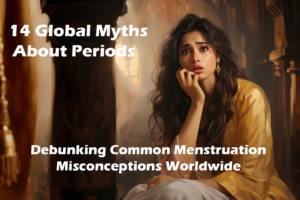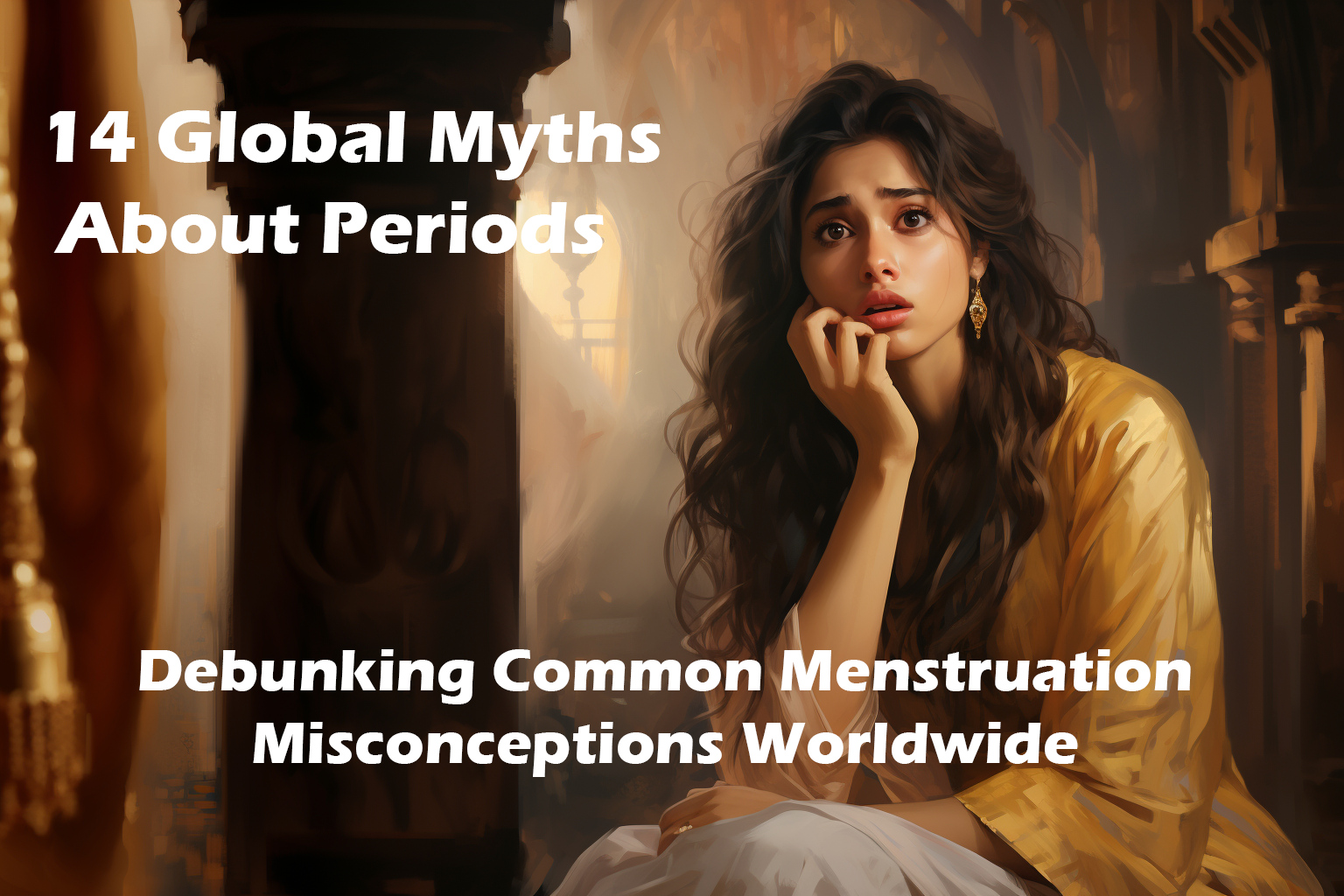Table of Contents
Myths about periods
Exploring myths about periods reveals a tapestry of cultural beliefs and practices that span the globe. In this comprehensive guide, we delve into 15 global misconceptions surrounding menstruation, shedding light on age-old tales and debunking them with scientific evidence. From societal taboos to traditional practices, discover how these myths have shaped perceptions and the importance of setting the record straight for future generations. These common myths are-
1. Menstruating Women Are Impure or Unclean
Throughout history, menstruation has been surrounded by myths and taboos. One of the most pervasive myths is the belief that menstruating women are impure or unclean. This belief is deeply rooted in various cultures and religions across the world, particularly in countries like India, Bali, Nepal, Israel, Armenia, Zimbabwe, and Sri Lanka.
In India, for instance, this myth is often linked to religious beliefs. Many temples and places of worship prohibit menstruating women from entering, based on the idea that their ‘impurity’ might desecrate the sacred space. Similarly, in Bali and Nepal, there are temples where women on their periods are not allowed to participate in religious ceremonies.
The origins of this myth can be traced back to ancient times when the understanding of menstruation was limited. The bleeding was often seen as mysterious, and without the knowledge of its biological significance, it was easier to label it as something ‘other’ or ‘unclean’. Over time, these beliefs became deeply ingrained in societal norms and customs.
From a scientific perspective, menstruation is a natural and essential part of the reproductive cycle. It is the body’s way of preparing for a potential pregnancy and shedding the uterine lining when pregnancy doesn’t occur. There’s nothing inherently dirty or impure about it. In fact, the menstrual flow is made up of blood, tissue from the lining of the uterus, and other cells – it’s as natural as any other bodily function.
It’s crucial to challenge and debunk such myths because they contribute to the stigmatization and marginalization of menstruating women. Labeling them as ‘impure’ can have severe psychological impacts, affecting their self-esteem and mental well-being. Moreover, these beliefs can lead to discriminatory practices, further deepening gender inequalities.
In conclusion, the idea that menstruating women are impure or unclean is a baseless myth rooted in ancient misunderstandings. With the advancement of science and education, it’s essential to shed these outdated beliefs and embrace a more informed and inclusive perspective on menstruation.
2. Isolation During Menstruation
Isolation during menstruation is another widespread practice rooted in cultural and societal beliefs. In certain countries, it’s believed that women on their periods should be separated from the community or family, sometimes even confined to specific huts or areas. This practice is particularly prevalent in countries like Nepal, Bhutan, and Papua New Guinea.
In Nepal, this practice is known as ‘Chhaupadi’. Women are required to stay in small huts or sheds away from their homes during their menstrual cycle. These huts are often poorly constructed, lacking basic amenities, and exposing women to various dangers, including wild animals, cold temperatures, and even violence. The belief behind this practice is that menstruating women might anger the gods or contaminate the home.
Similarly, in Bhutan and Papua New Guinea, there are traditions where menstruating women are isolated from the main household, often in separate huts or rooms. The reasons vary but are generally rooted in the idea of ‘impurity’ or the potential ‘harm’ a menstruating woman might bring to the community.
The practice of isolating menstruating women is not just physically dangerous but also psychologically damaging. It perpetuates the idea that menstruation is something shameful, something to be hidden away. This can lead to feelings of embarrassment, shame, and guilt among young girls and women.
From a scientific standpoint, there’s no reason to isolate menstruating women. Menstruation is a natural biological process, and there’s no evidence to suggest that menstruating women pose any risk to their communities. Such practices are based on age-old myths and superstitions that have no grounding in reality.
It’s essential to challenge these practices and educate communities about the realities of menstruation. By debunking these myths, we can pave the way for more inclusive and informed societies where women are not marginalized because of their natural bodily functions.
In conclusion, the practice of isolating menstruating women is based on unfounded myths and can have severe consequences for the physical and mental well-being of women. It’s high time we move beyond these outdated beliefs and promote a more understanding and inclusive view of menstruation.
3. Menstruating Women Spoil Food by Touching
One of the more intriguing myths surrounding menstruation is the belief that menstruating women can spoil food merely by touching it. This myth is prevalent in several countries, including India, Indonesia, Bolivia, Mongolia, Kazakhstan, Paraguay, and Hungary.
In India, for example, there’s a common superstition that if a menstruating woman touches pickles, they will spoil. Similarly, in Indonesia, there’s a belief that food touched by a menstruating woman will rot faster. In countries like Bolivia and Hungary, there are myths that dishes can curdle or wine can turn into vinegar if handled by someone on their period.
But where did these beliefs originate? Most of these myths can be traced back to ancient times when the understanding of menstruation and hygiene was limited. The menstrual cycle was not well-understood, and without proper sanitary products, there might have been concerns about hygiene. Over time, these concerns might have evolved into broader myths about menstruating women contaminating or spoiling food.
From a scientific perspective, there’s no evidence to suggest that menstruating women can spoil food by touching it. Menstruation is a natural biological process, and the menstrual flow is sterile unless it comes into contact with external bacteria. Moreover, the idea that someone’s menstrual status could affect the chemical composition of food items like pickles or wine is unfounded.
It’s essential to understand that these myths perpetuate negative stereotypes about menstruating women, furthering their marginalization in society. Such beliefs can lead to discrimination, with women being excluded from certain activities or roles, especially in communal settings.
In conclusion, the myth that menstruating women can spoil food by touching it is baseless and rooted in ancient misunderstandings about menstruation and hygiene. With the knowledge and scientific understanding we have today, it’s crucial to debunk such myths and ensure that women are not discriminated against based on natural bodily functions.
4. Adverse Effects on Plants
Another widespread myth associated with menstruation is the belief that menstruating women can adversely affect plants. According to this myth, if a woman on her period touches plants, they might wither, die, or not bear fruit. This belief is prevalent in countries like India, Russia, Romania, Guatemala, and Serbia.
In India, for instance, there’s a common belief in some regions that if a menstruating woman touches a plant or tree, it might not bear fruit or even die. Similarly, in Russia and Romania, there are age-old superstitions that gardens tended by menstruating women will not flourish.
The origins of this myth are not entirely clear, but it’s likely rooted in ancient beliefs about the ‘power’ of menstrual blood. In many cultures, menstrual blood was seen as potent, capable of both giving life and taking it away. This dual nature might have led to beliefs that menstruating women could harm plants.
From a scientific standpoint, there’s no evidence to support the idea that menstruating women can harm plants. Plants require specific conditions to grow, including the right amount of water, sunlight, and nutrients. The menstrual status of a person touching or tending to them has no bearing on their health or growth.
It’s worth noting that these myths can have real-world consequences. In societies where such beliefs are prevalent, women might be discouraged from pursuing careers in agriculture or horticulture. They might also be excluded from community gardening activities or rituals related to agriculture.
In conclusion, the belief that menstruating women can harm plants is another baseless myth that needs debunking. With the scientific knowledge we possess today, it’s essential to challenge such beliefs and ensure that women are not held back by unfounded superstitions.
5. Water-Related Myths
Water-related myths surrounding menstruation are prevalent in many cultures, often rooted in age-old beliefs about the ‘impurity’ of menstrual blood. These myths range from beliefs about bathing during menstruation to the idea that menstruating women can taint water sources. Let’s delve into some of these myths and their origins.
In Afghanistan and Iran, there’s a prevalent belief that bathing during menstruation can lead to infertility or illness. The idea behind this myth is that the cold water can ‘shock’ the body, disrupting the menstrual flow and leading to health complications. Similarly, in countries like Chile, Trinidad and Tobago, and Egypt, there are myths that menstruating women can ‘contaminate’ water sources, making them impure for others to use. Another widespread myth is that swimming during menstruation can attract sharks, a belief that has deterred many women from entering the water during their periods.
The origins of these myths are varied. The belief about bathing causing infertility might be linked to ancient ideas about the balance of ‘hot’ and ‘cold’ in the body, with menstruation seen as a ‘hot’ process that could be disrupted by ‘cold’ water. The myths about contaminating water sources are likely rooted in broader beliefs about the impurity of menstrual blood. As for the shark myth, it’s a more modern one, likely stemming from misunderstandings about sharks’ sensory abilities.
From a scientific perspective, there’s no evidence to support any of these myths. Bathing during menstruation is not only safe but also recommended for hygiene. Menstrual blood, like any other bodily fluid, does not have the power to ‘contaminate’ water sources. As for the shark myth, while sharks have an acute sense of smell, there’s no evidence to suggest that menstrual blood attracts them more than any other scent in the water.
In conclusion, water-related myths about menstruation are baseless and can have real-world consequences, from discouraging women from maintaining personal hygiene to keeping them away from water-based activities. It’s essential to debunk these myths and promote a more informed and inclusive understanding of menstruation.
6. Menstruating Women Impact Animals
Another set of myths surrounding menstruation pertains to the interaction between menstruating women and animals. In various cultures, it’s believed that menstruating women can have adverse effects on animals, particularly livestock. This chapter will explore these beliefs and their origins.
In Nepal, Uganda, and Kazakhstan, there’s a prevalent belief that menstruating women shouldn’t touch livestock, especially cows. Cows, being sacred animals in many cultures, are believed to be susceptible to the ‘impurity’ of menstruating women. In some regions, it’s believed that if a menstruating woman milks a cow, the milk will spoil or the cow will fall ill. Similarly, in countries like Samoa, there’s a belief that menstruating women shouldn’t engage in fishing as their presence can deter fish.
The origins of these myths are varied and complex. In many cultures, animals, particularly livestock, hold significant economic and symbolic value. Any potential threat to their well-being, even if based on superstition, is taken seriously. The myths might also be rooted in broader beliefs about the ‘power’ or ‘potency’ of menstrual blood and its ability to affect the natural world.
From a scientific perspective, there’s no evidence to suggest that menstruating women can harm animals or affect their behavior. Animals do not have an inherent ability to detect menstruation in humans, and there’s no biological reason why they would react adversely to menstruating women. The belief that menstruating women can spoil milk or deter fish is baseless and likely stems from broader societal taboos about menstruation.
In conclusion, the myths about menstruating women impacting animals are unfounded and can lead to discriminatory practices. Women might be excluded from essential economic activities like farming or fishing based on these beliefs. It’s crucial to challenge and debunk these myths, promoting a more informed and inclusive understanding of menstruation and its place in the natural world.
7. Menstruation and Sex
Sexual activity during menstruation is a topic surrounded by various myths and taboos in many cultures. These myths often discourage or even prohibit sexual intercourse during menstruation, citing potential harm to men, the possibility of illnesses, or even infertility. This chapter will delve into these beliefs, particularly those prevalent in countries like Kenya, Uganda, and Romania.
In Kenya and Uganda, there’s a widespread belief that engaging in sexual activity during menstruation can harm men. The specifics of this ‘harm’ vary, with some believing that men can contract diseases or even become impotent if they have intercourse with a menstruating woman. Similarly, in Romania, there’s a myth that sexual activity during menstruation can lead to various health complications for both men and women, including infertility.
The origins of these myths are multifaceted. In many cultures, menstruation is seen as a time of ‘rest’ or ‘cleansing’ for the woman’s body. Engaging in sexual activity during this time is believed to disrupt this natural process. Additionally, the taboos surrounding menstruation and the perceived ‘impurity’ of menstrual blood play a significant role in these beliefs. The idea that menstrual blood can ‘contaminate’ or ‘harm’ a man during intercourse is rooted in these broader societal taboos.
From a scientific perspective, there’s no evidence to suggest that sexual activity during menstruation can harm either partner. Menstrual blood is not ‘dirty’ or ‘contaminated.’ It’s a natural mixture of blood, tissue, and other cells. While there might be a slightly increased risk of transmitting certain infections during menstruation, with proper precautions, sexual activity during this time is generally considered safe.
In conclusion, the myths surrounding menstruation and sex are rooted in societal taboos and misunderstandings about the female body. It’s essential to challenge and debunk these myths, promoting a more informed and open dialogue about menstruation and sexual health.
8. Menstruating Women Can't Cook or Bake
Cooking and baking are essential activities in every culture, often associated with nurturing and care. However, in many societies, menstruating women are believed to have an adverse effect on these activities. This chapter will explore these beliefs, particularly those prevalent in countries like India, Bolivia, Poland, Ukraine, Sri Lanka, and Paraguay.
In India, for instance, there’s a common belief that menstruating women shouldn’t cook as the food might not turn out right. This is especially true for specific dishes, like pickles, which are believed to spoil if touched by a menstruating woman. Similarly, in Bolivia and Paraguay, there’s a myth that bread won’t rise if kneaded by someone on their period. In Poland and Ukraine, there are beliefs that dishes can spoil or not taste right if prepared by a menstruating woman.
The origins of these myths are varied. In many cultures, cooking and baking are seen as transformative processes, turning raw ingredients into nourishing meals. The presence of a menstruating woman, with her perceived ‘impurity,’ is believed to disrupt this transformation. Additionally, the taboos surrounding menstruation and the idea that menstrual blood can ‘contaminate’ or ‘spoil’ things play a significant role in these beliefs.
From a scientific perspective, there’s no evidence to support these myths. Menstruation does not affect a woman’s ability to cook or bake. The idea that menstrual status can affect the chemical composition of food or the outcome of a dish is unfounded. It’s essential to understand that these myths perpetuate negative stereotypes about menstruating women, further marginalizing them in society.
In conclusion, the myths about menstruating women impacting cooking and baking are baseless and rooted in societal taboos. It’s crucial to challenge and debunk these myths, promoting a more informed and inclusive understanding of menstruation and its place in daily activities.
9. Avoidance of Cold
The consumption of certain foods and drinks during menstruation is often regulated by cultural beliefs and practices. One such belief, prevalent in countries like Japan, South Korea, China, and Vietnam, is the avoidance of cold foods and drinks during menstruation. This chapter will delve into this belief, its origins, and its implications.
In Japan and South Korea, there’s a common belief that consuming cold foods or drinks during menstruation can disrupt the menstrual flow or even lead to blocked menstruation. This belief is rooted in traditional medical systems, which emphasize the balance of ‘hot’ and ‘cold’ energies in the body. Menstruation is often associated with ‘cold’ energy, and consuming cold foods or drinks is believed to exacerbate this imbalance, leading to health complications.
Similarly, in China and Vietnam, traditional medical beliefs discourage the consumption of cold foods during menstruation. Foods like ice cream, cold drinks, and certain fruits are often avoided by menstruating women in these countries.
From a scientific perspective, there’s limited evidence to support these beliefs. While it’s true that certain foods can influence the body’s temperature or blood flow, the idea that cold foods can disrupt menstruation is not supported by modern medical research. It’s worth noting that every individual’s body is different, and what might affect one person might not affect another. However, blanket prohibitions on cold foods for all menstruating women are not scientifically justified.
It’s essential to understand the implications of such beliefs. While they might seem harmless, they can contribute to the stigmatization of menstruation and impose unnecessary dietary restrictions on women. Moreover, these beliefs can lead to misinformation and confusion about menstrual health.
In conclusion, the belief in the avoidance of cold foods during menstruation is rooted in traditional medical systems and cultural practices. While respecting cultural beliefs is essential, it’s also crucial to promote a more informed and evidence-based understanding of menstruation and dietary practices.
10. Menstruation Affects Physical Objects
Throughout history, menstruating women have been attributed with various powers, both positive and negative. One such belief is that menstruating women can affect physical objects, either tarnishing them or causing them to malfunction. This chapter will explore these beliefs, particularly those prevalent in ancient Rome and modern-day Russia, Turkey, and other countries.
In ancient Rome, there was a belief that menstruating women could tarnish mirrors. The reflection of a menstruating woman was believed to have the power to dull the shine of a mirror, making it cloudy or unclear. Similarly, in Russia and Turkey, there are myths that menstruating women can blunt razors or cause crops to wither if they walk through fields.
The origins of these myths are varied and complex. In many cultures, menstruation was seen as a powerful and mysterious process, often associated with magic or supernatural forces. The idea that menstruating women could affect the physical world around them is likely rooted in these broader cultural beliefs about the power of menstruation.
From a scientific perspective, there’s no evidence to support these myths. Menstruation is a natural biological process, and there’s no reason to believe that it can affect physical objects in any way. The idea that a menstruating woman’s reflection can tarnish a mirror or that her presence can blunt a razor is unfounded and not supported by any scientific research.
It’s essential to understand the implications of such beliefs. While they might seem harmless, they contribute to the mystification and stigmatization of menstruation. Such beliefs can lead to discriminatory practices, with menstruating women being excluded from certain activities or roles based on unfounded superstitions.
In conclusion, the myths about menstruating women affecting physical objects are rooted in ancient cultural beliefs and superstitions. With the scientific knowledge we possess today, it’s crucial to debunk these myths and promote a more informed and rational understanding of menstruation.
11. Menstrual Blood Holds Power
Menstrual blood, in various cultures, has been attributed with magical or protective properties. These beliefs, while intriguing, often contribute to the mystification of menstruation. This chapter will delve into the beliefs prevalent in countries like Finland and Iceland regarding the power of menstrual blood.
In Finland, there’s a folklore belief that menstrual blood has magical properties. It was believed that if menstrual blood was mixed with certain herbs or potions, it could be used for love spells or to ward off evil spirits. Similarly, in Iceland, there are age-old tales of menstrual blood being used in rituals to protect homes or livestock from harm.
The origins of these beliefs can be traced back to ancient times when menstruation was seen as a mysterious and powerful process. The cyclical nature of menstruation, aligned with the phases of the moon, often led to associations with magic and the supernatural. Menstrual blood, being a tangible representation of this process, was believed to hold power.
From a scientific perspective, menstrual blood is a natural mixture of blood, tissue, and other cells. While it plays a crucial role in the reproductive cycle, there’s no evidence to suggest that it has magical or supernatural properties. However, it’s worth noting that in many cultures, various bodily fluids, not just menstrual blood, were believed to have magical properties. These beliefs are often rooted in broader cultural and spiritual practices.
It’s essential to understand the implications of such beliefs. While they contribute to the cultural richness and diversity of societies, they can also lead to the stigmatization and mystification of menstruation. In societies where menstrual blood is believed to have magical properties, menstruating women might be both revered and feared, leading to complex societal dynamics.
In conclusion, the beliefs about the magical properties of menstrual blood are rooted in ancient cultural and spiritual practices. While respecting these beliefs is essential, it’s also crucial to promote a more informed and rational understanding of menstruation, free from mystification.
12. Avoid Certain Foods
Dietary practices and restrictions during menstruation vary across cultures, often influenced by traditional beliefs and superstitions. One such belief prevalent in many countries is the idea that menstruating women should avoid certain foods. This chapter will explore these dietary restrictions, particularly those prevalent in countries like India, Cambodia, Vietnam, Lebanon, Madagascar, and Sudan.
In India, for instance, there’s a common belief that menstruating women should avoid sour foods like yogurt or tamarind as they can lead to heavier menstrual flows. Similarly, in Cambodia and Vietnam, there’s a belief that certain foods can cause menstrual cramps or disrupt the menstrual cycle. In Lebanon, Madagascar, and Sudan, there are myths that consuming specific foods during menstruation can lead to infertility or other health problems.
The origins of these dietary restrictions are varied. In many cultures, menstruation is seen as a time of ‘cleansing’ or ‘detoxification’ for the body. Consuming certain foods is believed to disrupt this process, leading to health complications. Additionally, traditional medical systems, which often emphasize the balance of energies or humors in the body, play a role in these beliefs.
From a scientific perspective, while diet can influence menstrual symptoms, there’s no evidence to support broad dietary restrictions for all menstruating women. For instance, while some women might experience bloating or cramps after consuming certain foods, this is not universal. It’s essential to understand that every individual’s body is different, and dietary practices should be tailored to individual needs rather than broad cultural beliefs.
In conclusion, the dietary restrictions imposed on menstruating women in various cultures are often rooted in traditional beliefs and medical systems. While it’s essential to respect cultural practices, it’s also crucial to promote a more informed understanding of menstruation and diet. Women should be empowered to make dietary choices based on their individual needs and experiences, rather than unfounded myths.
13. Restrictions on Activities
In many cultures, menstruating women face restrictions on various activities, ranging from physical work to participation in rituals. These restrictions are often rooted in traditional beliefs about the ‘weakness’ or ‘impurity’ of menstruating women. This chapter will delve into these restrictions, particularly those prevalent in countries like Jordan, Samoa, and Yemen.
In Jordan, for instance, there’s a common belief that menstruating women shouldn’t engage in heavy physical work. This belief is rooted in the idea that menstruation is a time of ‘rest’ for the body, and physical exertion can lead to health complications. Similarly, in Samoa, there’s a belief that menstruating women shouldn’t get tattoos. Tattoos, being a significant cultural and spiritual practice, are believed to be affected by the ‘impurity’ of menstruation. In Yemen, menstruating women are often excluded from certain rituals or ceremonies, based on the idea that their presence can ‘contaminate’ the ritual.
The origins of these restrictions are varied and complex. In many cultures, menstruation is seen as a time of vulnerability for women. The physical symptoms of menstruation, like cramps or fatigue, are often cited as reasons for these restrictions. Additionally, the taboos surrounding menstruation and the perceived ‘impurity’ of menstrual blood play a significant role in these beliefs.
From a scientific perspective, while menstruation can cause physical discomfort for some women, there’s no evidence to support broad activity restrictions for all menstruating women. Every individual’s experience of menstruation is different, and activity levels should be tailored to individual needs rather than broad cultural beliefs.
In conclusion, the restrictions imposed on menstruating women in various cultures are often rooted in traditional beliefs and societal taboos. While it’s essential to respect cultural practices, it’s also crucial to promote a more informed understanding of menstruation. Women should be empowered to make choices about their activities based on their individual needs and experiences, rather than unfounded myths.
14. Taboo to Discuss Menstruation
Open discussions about menstruation are often discouraged or stigmatized in many cultures. This societal taboo can lead to misinformation, shame, and a lack of understanding about menstrual health. This chapter will explore the taboo surrounding menstruation, particularly in countries like Malta.
In Malta, like in many other cultures, menstruation is considered a private matter. Discussions about menstrual health, products, or experiences are often limited to hushed conversations among women. This silence is rooted in broader societal beliefs about the ‘impurity’ or ‘shamefulness’ of menstruation.
The origins of this taboo are multifaceted. In many cultures, menstruation is associated with fertility and womanhood, topics that are often considered private or intimate. Additionally, the taboos surrounding menstruation are often linked to broader societal beliefs about gender roles and the place of women in society.
From a societal perspective, the taboo surrounding menstruation has real-world consequences. The lack of open dialogue about menstruation can lead to misinformation and myths, as discussed in previous chapters. Women might feel ashamed or embarrassed about their menstrual experiences, leading to a lack of understanding and support. Additionally, the silence surrounding menstruation can hinder efforts to improve menstrual health and hygiene, as policymakers and communities might not be aware of the challenges faced by menstruating women.
In conclusion, the taboo surrounding menstruation in various cultures is rooted in societal beliefs and gender norms. While respecting cultural practices is essential, it’s also crucial to promote open and informed discussions about menstruation. Breaking the silence surrounding menstruation is a vital step towards improving menstrual health and ensuring that women are not marginalized based on natural bodily functions.
15. Menstruating Women Impacting Non-Food Items
Beyond the realm of food and cooking, menstruating women in various cultures are believed to have an adverse effect on non-food items. These beliefs, often rooted in age-old superstitions, can lead to discriminatory practices and further stigmatization of menstruating women. This chapter will delve into these beliefs, particularly those prevalent in countries like the Philippines, Bolivia, Mongolia, and Nicaragua.
In the Philippines, there’s a belief that menstruating women shouldn’t handle certain materials, especially those used in weaving or crafting. The idea is that the ‘impurity’ of menstruation can affect the quality or outcome of the crafted item. Similarly, in Bolivia and Mongolia, there are myths that objects crafted or touched by menstruating women won’t turn out right or might even be cursed. In Nicaragua, there’s a belief that menstruating women can affect the outcome of certain rituals or ceremonies, especially those involving non-food items.
The origins of these beliefs are varied. In many cultures, crafting, weaving, and other such activities are seen as transformative processes, turning raw materials into valuable items. The presence of a menstruating woman, with her perceived ‘impurity,’ is believed to disrupt this transformation. Additionally, the taboos surrounding menstruation and the idea that menstrual blood can ‘contaminate’ or ‘spoil’ things play a significant role in these beliefs.
From a scientific perspective, there’s no evidence to support these myths. Menstruation does not affect a woman’s ability to craft, weave, or handle materials. The idea that menstrual status can affect the quality or outcome of a crafted item is unfounded. It’s essential to understand that these myths perpetuate negative stereotypes about menstruating women, further marginalizing them in society.
In conclusion, the myths about menstruating women impacting non-food items are baseless and rooted in societal taboos. It’s crucial to challenge and debunk these myths, promoting a more informed and inclusive understanding of menstruation and its place in various cultural activities.
Conclusion
Throughout this article, we have explored a myriad of myths surrounding menstruation from various cultures and countries. These myths, often rooted in age-old traditions and beliefs, have shaped societal perceptions of menstruating women and influenced their experiences for generations.
From beliefs about menstruating women being impure to myths about their impact on food, plants, animals, and even physical objects, these superstitions have often led to discriminatory practices. Women have been isolated, excluded from essential activities, and subjected to unnecessary restrictions based on unfounded beliefs.
While it’s essential to respect cultural practices and traditions, it’s equally crucial to challenge and debunk myths that perpetuate negative stereotypes and hinder progress. With the scientific knowledge and understanding of myths about periods we possess today, many of these myths can be easily refuted. However, the persistence of these beliefs highlights the deep-rooted nature of societal taboos surrounding menstruation.
Promoting open and informed discussions about menstruation is vital. Education and awareness campaigns can play a significant role in dispelling myths and ensuring that women are not marginalized based on natural bodily functions. Additionally, empowering women to share their experiences and challenge societal norms is crucial.
In conclusion, while myths about periods offer a fascinating insight into cultural beliefs and practices, they also underscore the need for change. As we move towards a more inclusive and informed society, it’s essential to leave behind unfounded superstitions and embrace a more rational and empathetic understanding of menstruation.

15 Global Myths About Periods: Debunking Common Menstruation Misconceptions Worldwide
Exploring the diverse and often surprising myths about periods from cultures around the world. From beliefs about menstruating women being impure to myths about their impact on food and physical objects, this article delves deep into the origins, implications, and scientific truths behind these age-old tales. Discover how societal taboos have shaped perceptions and understand the importance of debunking these myths for a more informed and inclusive future.

Menses After Delivery : Everything You Need to Know
Navigating the complexities of menses after delivery can be challenging for many women. This comprehensive guide delves into the intricacies of postpartum menstruation, hormonal shifts, and the importance of support during this transitional phase. Whether you’re a new mother or seeking knowledge about the changes that come with childbirth, understanding menses after delivery is crucial for optimal postpartum care and well-being.

8 Facts to Know Before Taking Medicine to Delay Periods
Menstruation is a natural process that many individuals experience regularly. However, there are times when delaying a period becomes desirable, whether for medical reasons, personal preferences, or special occasions. This article delves into the intricacies of the menstrual cycle, reasons for delaying periods, common medicine to delay periods, and the potential side effects and precautions to consider. Additionally, it explores natural methods that offer an alternative to medications. Whether you’re considering delaying your period or simply seeking knowledge, this article provides comprehensive insights into the topic

Ultimate Guide to Period Panties: Comfort during Menstruation
Period panties, also known as menstrual underwear, are a sustainable alternative to disposable menstrual products. They are designed to be leak-proof and absorbent, allowing women to comfortably manage their menstruation without the use of pads, tampons, or cups. These underwear come in various styles and absorbency levels to cater to different needs throughout the menstrual cycle.

Why Periods Delay- 10 reasons to understand
Understanding “why periods delay” is crucial for individuals navigating their reproductive health. From hormonal imbalances and stress to chronic diseases and lifestyle choices, various factors can influence menstrual regularity. This comprehensive article delves deep into the myriad reasons behind delayed periods, offering insights and guidance on recognizing irregularities and seeking timely medical advice. Whether you’re curious about the impact of weight fluctuations, the role of thyroid issues, or the effects of certain medications, this article provides a holistic overview of the factors that can affect menstrual cycles
Are you a victim of Period Cramps – Get updated in 5 Minutes
Navigating the world of period cramps can feel like a daunting journey. With throbbing pains and aching discomfort, they seem to bring a monthly trial for many. But do we really understand what’s happening? In this comprehensive guide, we unpack the science behind period cramps, delve into their causes, explore associated symptoms, and discuss various treatment options. We also look into prevention strategies, and highlight the psychological impact these monthly visitors can have. Whether you’re seeking knowledge or comfort, our guide on ‘All About Period Cramps’ is here to support you. Let’s make this journey together, understanding and managing period cramps, one step at a time.





